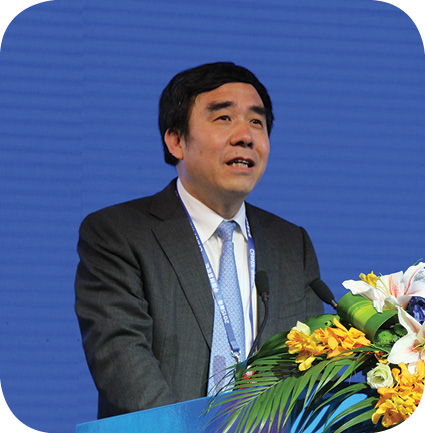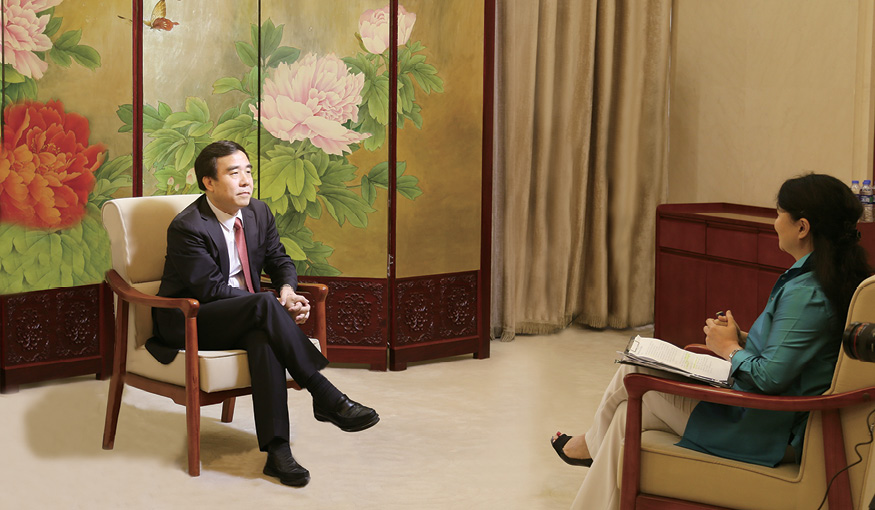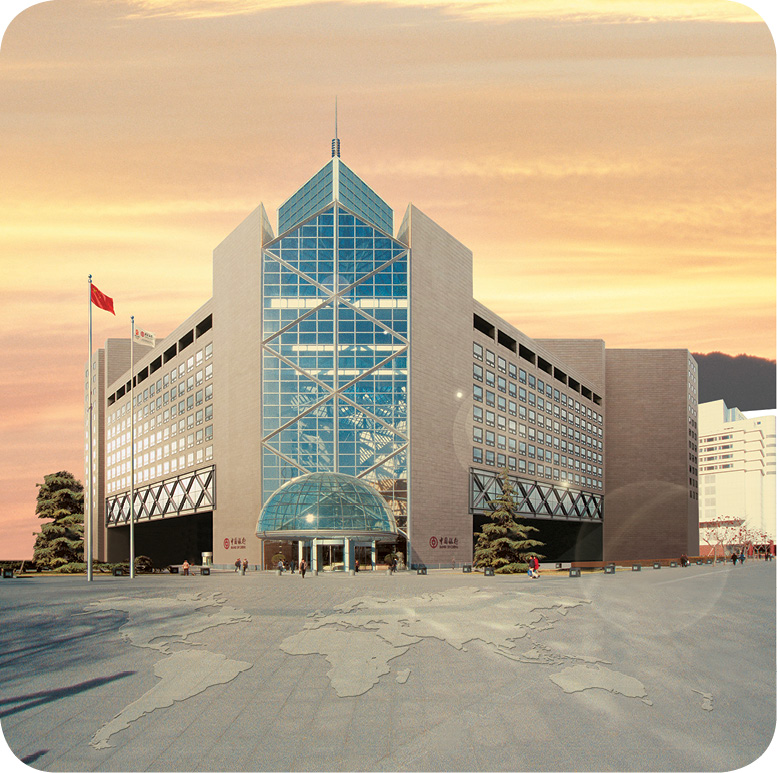- Home
- Media Kit
- Current Issue
- Past Issues
- Ad Specs-Submission
- Ad Print Settings
- Reprints (PDF)
- Photo Specifications (PDF)
- Contact Us

![]()
ONLINE

A Financial Bridge
Connecting Chinese and Overseas Companies
Editors’ Note
Tian Guoli joined the Bank of China (BOC) in April 2013, and was appointed to his current post in May 2013. From December 2010 to April 2013, he served as Vice Chairman of the Board of Directors and General Manager of China CITIC Group. During this period, he also served as Chairman of the Board of Directors and non-Executive Director of China CITIC Bank. From April 1999 to December 2010, Tian successively served as Vice President and President of China Cinda Asset Management Company, and Chairman of the Board of Directors of China Cinda Asset Management Corporation Limited. From July 1983 to April 1999, he held various positions in China Construction Bank (CCB), including sub-branch General Manager, Deputy Branch General Manager, Department General Manager of the CCB Head Office, and Assistant President of CCB. Tian has been serving as Chairman of the Board of Directors and a non-Executive Director of BOCHK (Holdings) since June 2013. He received a Bachelor’s Degree in Economics from Hubei Institute of Finance and Economics in 1983.
Company Brief
Bank of China (boc.cn) was formally established in February 1912 following the approval of Dr. Sun Yat-sen. In 1994, the bank was transformed into a wholly state-owned commercial bank. In August 2004, Bank of China Limited was incorporated. The bank was listed on the Hong Kong Stock Exchange and Shanghai Stock Exchange in June and July 2006 respectively. In 2014, Bank of China was enrolled again as a Global Systematically Important Bank, becoming the sole financial institution from emerging economies to be enrolled for four consecutive years. As China’s most international and diversified bank, the bank provides a comprehensive range of financial services to customers across the Chinese mainland and 44 countries or regions. The bank’s core business is commercial banking, including corporate banking, personal banking, and financial markets services. BOC International Holdings Limited, a wholly owned subsidiary, is the bank’s investment banking arm. Bank of China Group Insurance Company Limited and Bank of China Insurance Company Limited, both wholly owned subsidiaries, run the bank’s insurance business. Bank of China Group Investment Limited, a wholly owned subsidiary, undertakes the bank’s direct investment and investment management business. Bank of China Investment Management Co., Ltd., a controlled subsidiary, operates the bank’s fund management business. BOC Aviation Pte. Ltd., a wholly owned subsidiary, is in charge of the bank’s aircraft leasing business.

Exterior of the branch in Queens
You once made a thought-provoking metaphor: “A bank is like wine, better with age.” Bank of China, the most internationalized Chinese bank, has a history of more than 100 years. Like aged wine, how does the bank become fine wine over the course of the past century and maintain its vitality and advantages?
Legacy is built on history. Working in finance for over 30 years, I do feel running a bank is like making wine – you just can’t rush. Client base is built up little by little, talents developed generation by generation, and the bank’s reputation via word of mouth earned day by day.
Bank of China, founded in 1912, is the only Chinese bank that blazed its way through a history of over 100 years. In its early years, when a weak and impoverished China was torn apart by domestic troubles and foreign invasion, the bank’s forefathers had an international vision to set up operations in the countries and areas with booming finance, such as the U.K., Hong Kong, Singapore, and the U.S., etc. Today, Bank of China London Branch has a history of 86 years; Bank of China Singapore Branch has a history of 79 years. Bank of China, imbued with international DNA since day one, is gaining international recognition.
For more than a century, the bank that extols integrity and a sense of social responsibility has grown its business rapidly and maintained sound operations. As China has become the second largest economy, Bank of China’s assets have also reached 16 trillion yuan. What else are we capable of? I guess, apart from growing “big,” we are also eyeing “small,” which means we serve big corporate clients and small and medium-sized enterprises (SMEs) as well.
Chinese SMEs are eager to go and invest outside China. However, due to language, legal, and cultural barriers, there are some hurdles along the way. Meanwhile, in light of China’s high-speed growth for 30 years, its huge market and abundant capital, foreign SMEs are also drawn to China for market, clients, and partners. When such needs arise, Bank of China is naturally a financial bridge that connects SMEs, be it domestic and foreign, by leveraging on its financial service network that has been developed over the past 100 years. For instance, the bank brought Chinese SMEs to France, Hungary, and other European countries for business matchmaking, and helped them overcome language, legal, and cultural barriers. That explains our strong sense of social responsibility. When our company has reached a certain point, social responsibility becomes our calling. So we have a slogan: “Serving Society, Delivering Excellence.”

With a history of more than 100 years, Bank of China has its unique international advantages. However, other Chinese state-owned banks are vying for global presence. What’s your take on competition from your peers?
I will put it in a much broader perspective. You are right. The Bank of China is more than 100 years old and has its overseas presence for quite a while. Jokingly put, we call it “A Hundred Years of Solitude.” Where does the “solitude” come from? Back then, only a few Chinese companies went global, so they barely needed financial services. Therefore, no Chinese banks branched out overseas, except for Bank of China. In fact, commercial banking is like a free market – the more players in it, the easier it is to make money. We see numerous banks cluster on Wall Street or in the financial district. I don’t have to explain why.
Things have changed a lot. As more Chinese companies are going global, Chinese banks go with them. Peer competition does exist, but Bank of China, like vintage wine, has been around in the overseas markets for ages. We are quite confident in our customer loyalty and brand name effect. We hope Chinese peers will work with us, to serve clients and pair up businesses, to build up the “momentum.” Once the “momentum” is there, markets will rally up. I am convinced that Chinese banks will have a rosy outlook for their overseas endeavors.
“One Belt, One Road” is an often-quoted buzz phrase in articles about Chinese company’s “going global” strategy. What’s your view on its significance?
“One Belt, One Road” connects over 60 countries and a population of four billion, but the total economy alongside the regions carries less weight. “One Belt, One Road,” a timely strategy that Chinese President Xi Jinping proposed, is welcomed and well responded to by the international community.
The current sluggish world economy calls for new drivers of future growth. In this context, China has discovered the growth potential along “One Belt, One Road” to power the global economy. Given its economic prowess, strong execution, and abundant capital, enabled by other countries’ participation, China will translate this strategy into reality step by step. Things usually go like this: the stronger the calling is, the more participants pitch in, and the more likely that dreams will come true.

How does “One Belt, One Road” shape the future pathway of Bank of China?
First, “One Belt, One Road” includes Southeast Asia, Central Asia, North Africa and other regions, where Bank of China has many branches and operations in place. Until now, we have set up branches and offices in nearly 20 countries along “One Belt, One Road,” thereby making our network stand out. Besides, cross-border financial services need language and cultural expertise. Bank of China has a large talent pool of professionals well-versed in less common languages, local cultures, and research. In this two-way street, the bank is honored to be part of this national strategy. “One Belt, One Road” is also a huge business opportunity that sets the stage for Bank of China.
As Chinese companies are eager to go global, foreign companies want to go to China as well. Any pointers for them? How do you perceive the outlook for Chinese companies?
The Chinese economy, in its new normal, will somehow face downward pressure, but this is a result of macro-control policies. The constant pursuit of high-speed growth can only be achieved at the cost of environmental deterioration, a development practice far from sustainable. If we want to breathe fresh air, environmental protection has to be stricter, so the economy should pace down a bit. In a sense, China is making a contribution to the world as it shifts towards an environmentally-friendly, low carbon economy.
Nowadays, Chinese companies have more quality products, state-of-the-art manufacturing equipment, and world-leading techniques. So foreign companies will see the bar is raised as China brings in foreign investment and business. China always welcomes those quality companies with advanced technology, though. Also, foreign investors are required to meet higher environmental protection standards in China.

New office of Bank of China at Byrant Park
Speed and quality is paradoxical, like spear and shield. China has seen 30 years of high-speed growth. The colossal economic scale calls for a sounder economic structure and sustainable development. As a result, the speed for growth will slow down a bit. Despite that, China maintains a growth rate of 7 percent. It is still quite impressive if other countries are put in the picture.
China also stresses labor rights more and beefs up laws to better protect the labor force. Thus, companies have to promise improved working conditions and more employee benefits. When there is a handful for companies to deal with, growth speed might be compromised and expenses raised, but quality and efficiency will improve accordingly.
Bank of China, as a global company, needs global talents. The magazine has noticed that the bank is among the first to welcome global talents with open arms. What’s your strategy for human capital?
Bank of China has over 600 branches in 42 countries and regions, besides China’s mainland. Nearly 20,000 employees work for BOC overseas institutions, and roughly 80 percent of them are local hires. To attract the best talents, we have to open our arms. An authoritative survey has shown that Bank of China has topped the ranking of “the Ideal Employers” for best college graduates over the past seven years. Branding is our trump card, and we will hold on to it.
As a matter of fact, it is the call of duty for Bank of China executives and the “heads” at various levels to discover talent and put them in the right positions.
You’ve rolled out a series of reforms since you took office? Can you talk more about that?
Reform is a big word. In my opinion, when we do is streamline work process, improve efficiency, and make roles and responsibilities clearer. That’s why the bank merged and reorganized some departments. More importantly, we advocate a culture that encourages the best people to work at the grassroots level and in arduous areas. We have many smart graduates from top-tier universities, but they may know little about markets and grassroots, so we encourage young people to work there. In fact, they are willing to go, but may feel indecisive if policies are not in place. For us as managers, guiding policies do the trick. Many of them find those experiences rewarding and life-changing.

Exterior of the Head Office
Bank of China believes that those with potential and prospect should be encouraged to go through hardship in arduous areas. Others may argue that banks should send their best people to the most promising places, such as New York, Beijing, Shanghai, etc. believing that those arduous areas have little to offer. In fact, it’s not true. A banking practitioner should be business-savvy and resilient in the ever-changing market. Only hardship can make them strong-willed and resilient enough. Sometimes, those experiences are rare finds in big metropolises. As the old Chinese saying goes, “The most capable officials usually rise from humble counties, just as the most valiant generals start as low-ranking soldiers.” Why send the best people to the arduous areas? We want them to get trained and grow.
You just mentioned a necessary path from a young professional to a manager. How about you?
Let’s not focus on me. But I’d like to share two fortunate things that happened to me: First, I was lucky enough to be admitted to university in 1979. That was a quite unique era, and the national reform and opening up had just unfolded. My generation witnessed rapid development in China. Back then, college graduates were scarce and sought after by employers. Second, I fortunately started my careers at the grassroot level, so I learned a lot. Being smart isn’t the surest way to success if you are not tempted by time and experiences. I’ve told that to many young people. Some college graduates wish to stay at the headquarters and feel unfortunate to be assigned to the grassroot areas. They might miss the point. Working at the grassroots level will be a valuable asset, and I felt tremendously lucky to start from there.
You are a seasoned banker in the financial sector with many titles. If all those titles are removed from your business card and only your name was left, tell me who you are?
I am just a guy who’s spent his entire career life in finance. How times flies. I am in my fifties, not a young guy anymore, but I feel very proud of myself, still working in finance.
When people mention Bank of China, what do you want them to think about?
Bank of China is a bank of global network and services. As Bank of China is always with customers, I hope those outbound Chinese entrepreneurs and tourists will feel quite confident in our accessible global services; meanwhile, as Bank of China is always there for them, those inbound businesspeople and tourists will have a sense of familiarity and feel at home in China.•